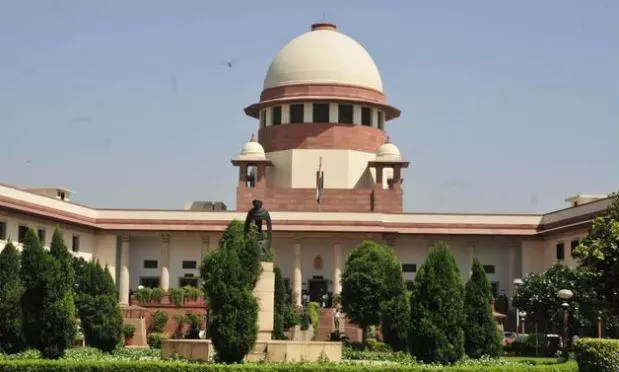Excise policy scam: SC defers Kejriwal's plea hearing to September 5

The Supreme Court on Friday deferred till September 5 hearing on Delhi Chief Minister Arvind Kejriwal's pleas seeking bail and challenging the arrest by the CBI in the alleged excise policy scam (File Photo)
New Delhi: The Supreme Court on Friday deferred till September 5 hearing on Delhi Chief Minister Arvind Kejriwal's pleas seeking bail and challenging the arrest by the CBI in the alleged excise policy scam. A bench of justices Surya Kant and Ujjal Bhuyan allowed the CBI to file its counter affidavit in the matter and gave two days' time to Kejriwal to file a rejoinder.
Senior advocate Abhishek Singhvi, appearing for Kejriwal, said the CBI filed a counter affidavit in only one of the pleas and it was served upon them at 8 pm on Thursday. ASG SV Raju said they will file the counter in another plea in one week.
The bench then posted the matter for further hearing on September 5. Kejriwal has filed two separate petitions challenging denial of bail and against his arrest by the CBI in the case. He has challenged the August 5 orders of the Delhi High Court.
On August 14, the top court refused to grant interim bail to Kejriwal in the case and sought a response from the probe agency on his plea challenging his arrest. Kejriwal was arrested by the CBI on June 26. The Delhi High Court had on August 5 upheld the arrest of the chief minister as legal, and said there was no malice in the acts done by the CBI which was able to demonstrate how the AAP supremo could influence witnesses who could muster the courage to depose only after his arrest.
The high court had asked him to move the trial court for regular bail in the CBI case. The high court had noted that the loop of evidence against the chief minister got closed after collection of relevant evidence following his arrest by the CBI and it cannot be said that it was without any justifiable reason or illegal.
It said Kejriwal is not an ordinary citizen but a distinguished recipient of the Magsaysay Award and the convenor of the Aam Aadmi Party. "The control and the influence which he has on the witnesses is prima facie borne out from the fact that these witnesses could muster the courage to be a witness only after the arrest of the petitioner, as highlighted by the special prosecutor.
"Also, it establishes that the loop of evidence against the petitioner got closed after collection of relevant evidence after his arrest. No malice whatsoever, can be gathered from the acts of the respondent (CBI)," the high court had said. The high court had dismissed Kejriwal's plea challenging his arrest, saying it was only after sufficient evidence was collected and sanction was obtained in April, 2024 that the agency proceeded with further probe against him.
It had noted that the links to the crime extended even to Punjab but material witnesses were not coming forward due to the influence exercised by Kejriwal by virtue of his position. It was only after he got arrested that the witnesses came forward to record their statements, the high court had said.
The chief minister, who was arrested by the ED on March 21, was granted bail by the trial court in the money laundering case on June 20. However, the trial court's order was stayed by the high court. On July 12, the top court granted him interim bail in the money laundering case. The excise policy was scrapped in 2022 after the Delhi lieutenant governor ordered a CBI probe into alleged irregularities and corruption involving its formulation and execution.
According to the CBI and the ED, irregularities were committed while modifying the excise policy and undue favours extended to licence holders.
( Source : PTI )
Next Story

